Linnea Tanner's Blog, page 12
July 15, 2024
Debra Borchert Her Own War #HerOwnWar #DebraBorchert #ChateauDeVerzatSeries #BlogTour #TheCoffeePotBookClub @cathiedunn
I‘m delighted to feature author Debra Borchert again in The Coffee Pot Book Club Blog Tour being held between July 15th – 26th, 2024. Debra Borchert is the author of the Historical Fiction, Her Own War (Château de Verzat Series, Book #3), released by Le Vin Press on July 14th, 2024 (438 pages).
Below are highlights and editorial reviews of Her Own War, Debra Borchert’sauthor bio, and an excerpt from her book.

Tour Schedule Page: https://thecoffeepotbookclub.blogspot.com/2024/06/blog-tour-her-own-war-by-debra-borchert.html
HIGHLIGHTS: HER OWN WAR

Her Own War
(Château de Verzat Series, Book #3)
By Debra Borchert
Blurb:
As Napoleon Rises from the Ashes of The French Revolution, One Woman Dares to Spy Against Him
Sentenced to eight months in an insane asylum for the crime of impersonating a man, Geneviève LaGarde fears giving birth in a filthy cell will mean certain death for her and her unborn child. Desperate for her release, her husband, Louis, trades his freedom for hers and must join Bonaparte’s army in Egypt.
As Geneviève wages her own war against the tyrannical general, she not only risks her own life but also those of her children and the four hundred families who depend on the Château de Verzat estate. Knowing her desperate actions could cause the government to confiscate the entire vineyard, she sacrifices everything to save her husband and protect the people who become her family.
A captivating tale of the power of love, hope, and courage, and the strength of community.
Buy Links:
This title will be on #KindleUnlimited for the first 90 days.
Universal Buy Link: https://books2read.com/u/bodVqZ
EDITORIAL REVIEWS: HER OWN WAR

“Fans of historical fiction will find this novel a most captivating read.” —Kirkus Reviews
“For fans of Stephanie Dray’s The Women of Chateau Lafayette.” —Publishers Weekly BookLife Editor’s Pick
“A compelling story of love, war, and fierce family loyalty. While the narrative stays true to the social mores of the French Revolutionary era, Borchert gives her readers powerful and active female characters who often cunningly use conventional gender expectations to conceal their real motives and actions. Fans of historical fiction will find this novel a most captivating read.” —Kirkus Reviews
“Readers of historical fiction with a strong current of love and loss will enjoy watching both Louis and Geneviève fight their own battles in hopes of reuniting—and reunifying their ravaged country. Sweeping, passionate portrait of the everyday lives in Bonaparte’s France.” —Publishers Weekly BookLife Editor’s Pick
“Set against the tumultuous backdrop of war-ravaged France during the French Revolution and Napoleonic Wars, the novel masterfully merges historical accuracy with fictional storytelling, plunging readers into an immersive and authentic world. Geneviève’s strong-willed nature and unwavering determination make her an intriguing protagonist. Her interactions with others, particularly Louis and Aurélia, reflect themes of resilience, human connection, and the complexities of personal relationships. The dialogue crackles with wit and the smooth pacing and the tight plotting keep readers invested. Simply un-put-downable.” —The Prairies Book Review
“With meticulous attention to detail, Borchert grounds her portrayal of wartime experiences in historical context and realism, drawing upon thorough research and actual events to vividly depict the trials of the era. Throughout, the book explores a myriad of themes, such as family, identity, resilience, human connection, and the complexities of personal relationships while raising questions about the price of war, the boundaries of morality, and the impact of violence on individuals and communities. An absolute stunner.” —BookView Review
“The divisive tragedy of war pulls a fearless fighter from the vineyard to the front lines in Her Own War by Debra Borchert, a gripping and lyrical work of historical fiction.” —SPR
AUTHOR BIO: DEBRA BORCHERT

Debra Borchert has had many careers: clothing designer, actress, TV show host, spokesperson for high-tech companies, marketing and public relations professional, and technical writer for Fortune 100 companies. Her work has appeared in The New York Times, San Francisco Chronicle, The Christian Science Monitor, and The Writer, among others. Her short stories have been published in anthologies and independently.
A graduate of the Fashion Institute of Technology, she weaves her knowledge of textiles and clothing design throughout her historical French fiction. She has been honored with a Historical Novel Society Editors’ Choice, Publishers Weekly BookLife Editor’s Pick, and many other five-star reviews.
Author Links:
Website Twitter Facebook LinkedIn Instagram
Threads Pinterest Book Bub Amazon Author Page Goodreads
EXCERPT: HER OWN WAR

Château de LaGarde Orphanage
Auguste crossed his arms and stared purposefully at me. “What happened to Papa?”
My shoulders tensed. I wouldn’t lie to my brother, but the truth would hurt. And I wouldn’t be here to help him heal. His mother should have consoled him, played with him, reassured him he was safe. “What did Maman tell you?”
“That he went away. I know that’s not true.” The pout he’d made as a little boy pulled at his lower lip.
“Let’s walk.” I headed for a stone bench farther away from the other boys and sat. “What have you heard?”
He pounded his fist on the stone bench. “He was a monster.”
Who would be so cruel to tell Papa’s own child? I covered Auguste’s fist, but he pulled it from me. “What else?” I asked.
“He was guillotined.”
I closed my eyes. I had wanted to protect him, but it wasn’t possible. “Did the other boys tell you that?”
He shook his head. “They don’t know.”
That was something to be grateful for. But who would tell him? Etty couldn’t have admitted the truth. “Then who told you?”
“Madame Suzanne.”
A prickling crossed my shoulders. “Did you ask her?”
He picked up a handful of gravel, chose a pebble and threw it at the pond. “The last time you visited, she wanted to know who you were. When I didn’t tell her, she told me she knew my father.” He tossed another pebble and the plunking it made as it hit the water was an oddly cheerful sound.
“She didn’t know him.”
He looked up at me. The innocence he’d possessed had tarnished over the past six years.
“I still didn’t tell her your name, and she got angry.” He flung all the pebbles, plunking and spraying water droplets. “She told me my father deserved to have his head chopped off.”
My hands grabbed the bench like I was strangling the bitch. After sentencing thousands—without trial—my father did deserve exactly that which he’d sentenced thousands to, but I could not admit it to his son. “Papa did not deserve that.”
“Is it true? Did Papa go to the guillotine?” He clung to my hand.
I put my arm around him and hugged him to my side. “You know Papa worked for the old government?”
“So what?”
A trembling moved through me, and I hoped he couldn’t feel it. “Papa was ordered to try people who were accused of crimes, crimes that if proven, were punishable by death.”
He looked up, his cheeks quivering. “He sent them to the guillotine?”
“Sometimes prison and sometimes he sentenced them to execution. He was not the only person who made that decision. There was a council and jurors who decided guilt.”
“If there were others, why did she call only him a monster?”
I longed to say: A woman who is also a monster, a woman who cares not one whit for a child’s heart. I didn’t want to give her the benefit of the doubt, but I didn’t want Auguste to think every woman could be so cruel. “She may have lost a loved one to the guillotine, and she blames Papa.”
Tears brimmed. “Do you think Papa was a monster?”
I wanted to scream at the top of my voice, yes, but I could not hurt my brother. He loved Papa. Long ago, I did too. “I think Papa did his job as best as he could. And when the old government faltered, the new Directoire needed to get rid of the old members.” I longed to caress Auguste’s cheek but didn’t want the boys to see. “And that included Papa.”
He dragged his sleeve across his eyes. I wanted to cry for my brother’s hurt.
He sniffed. “Does it hurt?”
“Does—” I realized he meant the guillotine. “No. It is most humane. That is why Monsieur Guillotine invented it.” At least that’s what the Revolutionaries touted. I wondered why people didn’t die of fright before they arrived at the machine.
“Auguste!” One of the boys held up a fish. “I hooked one.”
My brother shouted. “It’s huge!”
The boy held the flapping fish on a rock, and another smashed a stone on its head. “We can have it for supper!” shouted the fisherman.
Relieved by the interruption, I hoped he wouldn’t ask where Papa was buried, for I suspected he’d landed in a mass grave with no marker. Another secret I couldn’t tell him.
“Want to go fishing, Gen?”
“You go ahead. I must leave for Paris.” I patted his hand. “Thank you for not telling Suzanne who I am. You’ll continue to keep our secret? Everyone here thinks I’m a man.”
“Am I not your brother?”


Twitter: @cathiedunn
Instagram & Threads: @thecoffeepotbookclub
Bluesky: @cathiedunn.bsky.social
July 11, 2024
Series Book Blast The Sea Witch Voyages Helen Hollick #NauticalAdventure #Pirates #GoldenAgePiracy #SupernaturalAdventure #PiratesOfTheCaribbean #BlogTour #BookBlast #TheCoffeePotBookClub @HelenHollick @cathiedunn
I’m pleased to host the Book Blast for The Sea Witch Voyages (Series) in The Coffee Pot Book Club Blog Tour being held on July 11th, 2024. The Sea Witch Voyages (Series) is a Nautical Adventure with a touch of Supernatural Fantasy published by Penmore Press & Taw River Press. The series consists of 6 books and 1 prequel novella.
Below are highlights of The Sea Witch Voyages (Series) and Helen Hollick’s author bio.

Tour Schedule Page: https://thecoffeepotbookclub.blogspot.com/2024/06/blog-tour-sea-witch-voyages-by-helen-hollick.html
HIGHLIGHTS: THE SEA WITCH VOYAGES SERIES

The Sea Witch Voyages (Series)
By Helen Hollick
Blurb:
Trouble follows Captain Jesamiah Acorne like a ship’s wake…
The early 1700s: from the sun of the Caribbean to the eerie mists of England’s Exmoor in Devon, the Sea Witch Voyages follow the adventures (misadventures?) of Captain Jesamiah Acorne. Orphaned at almost fifteen Jesamiah escaped his home in Virginia and the bullying of his half-brother to join with his father’s old friend, Captain Malachias Taylor – a kindly man, but also a rogue of a pirate.
Jesamiah eventually captains his own ship, but at Cape Town, South Africa, he is to meet the girl who becomes the love of his life – Tiola Oldstagh, a midwife, healer… and a White Witch with the gift of Craft.
Accepting amnesty from Governor Woodes Rogers of Nassau, Jesamiah turns to a legal, married, life, except various governors, ex-lovers, bad-tempered pirates, lingering ghosts and other non-human entities seem to have different ideas.
Jesamiah Acorne: a swashbuckling amalgamation of Hornblower, Jack Aubrey and Jack Sparrow mixed with Indiana Jones, James Bond and Bernard Cornwell’s Richard Sharpe.
Voyage with Jesamiah aboard Sea Witch and sail into the ocean realm of fast-paced, exciting nautical adventures.
Note: Contains adult language and behaviour.
Buy Links:
Titles on #KindleUnlimited: When the Mermaid Sings and Gallows Wake
Universal Amazon Author Page Link: https://viewauthor.at/HelenHollick
Sea Witch – Voyage 1
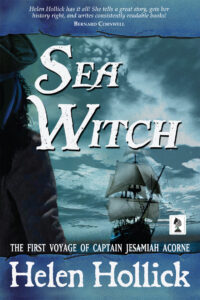
Buy Link: https://viewbook.at/SeaWitch
What Amazon readers say about Sea Witch:
“WOW! I was mesmerised from the very first words in the very first chapter. I felt I was actually there with Jesamiah and his fellow pirates; such was the reality of the story. I could almost smell the sea, feel the wind blowing and hear the sounds of the creaking ship.”
“I was very impressed with the attention to historical detail and the alluring descriptions of the sea and its sailing ships. The author confesses that she has taken a few liberties with history to make her story neat and tidy, but I think these are entirely justified for the sake of such a compelling tale.”
“I thoroughly enjoyed this well-told tale. Helen Hollick has created a terrific, likable rogue in Jesamiah Acorne; a young man with a dark past and very bright future – if he survives to enjoy it. Details about the age of sail, life on board and ashore, and the sense that sea has a special, sinister life of its own added to the pleasure of reading. I shall be following this series from now on. Great stuff!”
“Helen Hollick’s forte is her ebullient imagination. Everything is original, from her writing, which is vivid and yet as economical as conversational French, where unnecessary words (‘the’, ‘and’) are dropped for fluency. Notable is the lavish use of the color blue, so expensive and cherished at the time, that the cheeky blue of Jesamiah’s ribbons is almost eclipsed by the sheer arrogance of painting his ship — Sea Witch — the same blue that was the prerogative of monarchs and prelates! And there are wonderful jokes, snitched from real history, such as the raid of a merchant ship by a crew of pirates who merely needed a haul of hats. This book is strongly recommended for young adults who want a rousing story, and also for those who are older who want a thought-provoking new approach to the traditional pirate yarn.”
Pirate Code – Voyage 2

Buy Link: https://viewbook.at/PirateCode
Bring It Close – Voyage 3
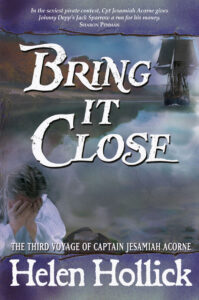
Buy Link: https://viewbook.at/BringItClose
Ripples In The Sand – Voyage 4

Buy Link: http://viewbook.at/RipplesInTheSand
On The Account – Voyage 5
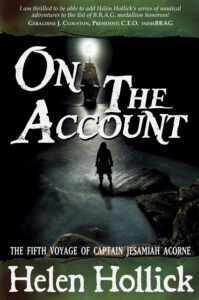
Buy Link: https://viewbook.at/OnTheAccount
Gallow’s Wake – Voyage 6
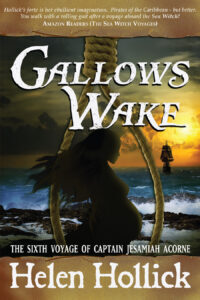
Buy Link: https://mybook.to/GallowsWake
When The Mermaid Sings – A Prequel Novella

Buy Link: https://viewbook.at/WhenMermaidSings
AUTHOR BIO: HELEN HOLLICK
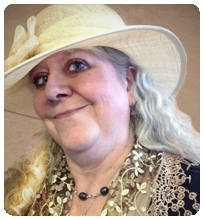
First accepted for traditional publication in 1993, Helen became a USA Today Bestseller with her historical novel, The Forever Queen (titled A Hollow Crownin the UK) with the sequel, Harold the King (US: I Am The Chosen King) being novels that explore the events that led to the Battle of Hastings in 1066. Her Pendragon’s Banner Trilogy is a fifth-century version of the Arthurian legend, and she writes a nautical adventure/supernatural series, The Sea Witch Voyages. She has also branched out into the quick read novella, ‘Cosy Mystery’ genre with her Jan Christopher Mysteries, set in the 1970s, with the first in the series, A Mirror Murder incorporating her, often hilarious, memories of working as a library assistant. The fifth in the series, A Memory Of Murder, was published in May 2024.
Her non-fiction books are Pirates: Truth and Tales and Life of A Smuggler. She is currently writing about the ghosts of North Devon for Amberley Publications, and Jamaica Gold for her Sea Witch Voyages.
Recognised by her stylish hats, Helen attends conferences and book-related events when she can as a chance to meet her readers and social-media followers, although her ‘wonky eyesight’ as she describes her condition of Glaucoma, and severe arthritis is becoming a little prohibitive for travel.
She lives with her family in an eighteenth-century farmhouse in North Devon with their dogs and cats, while on the farm there are showjumper horses, fat Exmoor ponies, an elderly Welsh pony, geese, ducks and hens. And several resident ghosts.
Author links:
Website: https://helenhollick.net/
Amazon Author Page: https://viewauthor.at/HelenHollick
Facebook: https://www.facebook.com/helen.hollick
X/Twitter: https://x.com/HelenHollick
Blog: https://ofhistoryandkings.blogspot.com/ supporting authors & their books
Pinterest: https://www.pinterest.co.uk/helenhollick/
Monthly newsletter: Thoughts from a Devonshire Farmhouse
https://ofhistoryandkings.blogspot.com/2024/01/thoughts-from-devonshire-farmhouse.html
Authors’ endorsements:
“Helen Hollick has it all! She tells a great story, gets her history right and writes consistently readable books!” ~ Bernard Cornwell
“A wonderful swashbuckler of a novel. Fans of Pirates of the Caribbean will love this to pieces of eight.” ~ Elizabeth Chadwick
“In the sexiest pirate competition Cpt. Jesamiah Acorne gives Johnny Depp’s Jack Sparrow a run for his money.” ~ Sharon K. Penman

 Twitter: @cathiedunn
Twitter: @cathiedunn
Instagram & Threads: @thecoffeepotbookclub
Bluesky: @cathiedunn.bsky.social
July 9, 2024
Book Spotlight The Virgins of Venice Gina Buonaguro #TheVirginsofVenice #HistoricalFiction #Venice #Renaissance #BlogTour #TheCoffeePotBookClub @cathiedunn
I am pleased to spotlight the book, The Virgins of Venice, by Gina Buonaguro in The Coffee Pot Book Club Blog Tour being held on July 10th, 2024. The Virgins of Venice is a Historical Fiction published by HarperAvenue on December 13, 2022 (432 pages).
Below are highlights of The Virgins of Venice and Gina Buonaguro’s author bio.

Tour Schedule Page: https://thecoffeepotbookclub.blogspot.com/2024/06/blog-tour-the-virgins-of-venice-by-gina-buonaguro.html
HIGHLIGHTS: THE VIRGINS OF VENICE
 The Virgins of Venice
The Virgins of Venice
by Gina Buonaguro
Audiobook narrator: Carlotta Brentan
Blurb:
In sixteenth-century Venice, one young noblewoman dares to resist the choices made for her
Venice in 1509 is on the brink of war. The displeasure of Pope Julius II is a continuing threat to the republic, as is the barely contained fighting in the countryside. Amid this turmoil, noblewoman Justina Soranzo, just sixteen, hopes to make a rare love marriage with her sweetheart, Luca Cicogna. Her hopes are dashed when her father decides her younger sister, Rosa, will marry in a strategic alliance and Justina will be sent to the San Zaccaria convent, in the tradition of aristocratic daughters. Lord Soranzo is not acting only to protect his family. It’s well known that he is in debt to both his trading partners and the most infamous courtesan in the city, La Diamante, and the pressure is closing in.
After arriving at the convent, Justina takes solace in her aunt Livia, one of the nuns, and in the growing knowledge that all is not strictly devout at San Zaccaria. Justina is shocked to discover how the women of the convent find their own freedom in what seems to her like a prison. But secrets and scandals breach the convent walls, and Justina learns there may be even worse fates for her than the veil, if La Diamante makes good on her threats.
Desperate to protect herself and the ones she loves, Justina turns to Luca for help. She finds she must trust her own heart to make the impossible decisions that may save or ruin them all.
Buy Links:
Universal Buy Links:
https://books2read.com/u/49O7NW
https://ginabu.com/the-virgins-of-venice/
AUTHOR BIO: GINA BUONAGURO

Gina Buonaguro is the co-author of The Wolves of St. Peters, Ciao Bella and The Sidewalk Artist, as well as several romance titles under the name Meadow Taylor. The Virgins of Venice is her first solo novel.
She has a BA in English from Villanova University in Pennsylvania and earned an MA in English from the University of British Columbia while on a Fulbright Scholarship. Born in New Jersey, Gina Buonaguro lives in Toronto.
Author Links:
Website: https://ginabu.com/
Facebook: https://www.facebook.com/GinaBuWriter
LinkedIn: https://www.linkedin.com/in/gina-buonaguro-35318934/
Book Bub: https://www.bookbub.com/profile/gina-buonaguro
Amazon Author Page: https://www.amazon.com/stores/Gina-Buonaguro/author/B002LAAF9I
Goodreads: https://www.goodreads.com/author/show/219059.Gina_Buonaguro

 Twitter: @cathiedunn
Twitter: @cathiedunn
Instagram & Threads: @thecoffeepotbookclub
Bluesky: @cathiedunn.bsky.social
July 8, 2024
Roberta Tracy Zig Zag Woman Series #HistoricalMystery #HistoricalFiction #BlogTour #TheCoffeePotBookclub @RobertaTra72258 @cathiedunn
I‘m delighted to welcome Roberta Tracy as the featured author in The Coffee Pot Book Club Blog Tour being held between July 8th – 12th, 2024. Roberta Tracy is the author of the Historical Mystery, Zig Zag Woman, released by Historium Press on April 16, 2024 (248 pages).
Below are highlights of Zig Zag Woman, Roberta Tracy’s author bio, and an excerpt from her book.

Tour Schedule Page: https://thecoffeepotbookclub.blogspot.com/2024/06/blog-tour-zig-zag-woman-by-roberta-tracy.html
HIGHLIGHTS: ZIG ZAG WOMAN

Zig Zag Woman
by Roberta Tracy
Blurb:
The last thing LAPD Detectives McManus and Tyson expect to find behind Pantages Theatre is a body rolled up in a blanket. The last thing Margaret Morehouse, one of the city’s first policewoman with arrest powers, expects to do is join the investigation. When a deadly explosion at the L. A. Times derails their efforts, Margaret finds herself at a crossroads and strikes out on her own, a path leading to delusion and self-discovery on a vaudeville stage. Her husband’s nephew Leland further complicates the situation by sharing a ransom note and confiding his failure to report his wife’s disappearance at the Dominguez Air Meet.
A brief stint as a magician’s assistant takes Margaret to Chicago, where she almost signs on as a zig zag girl, the term used for ladies performing in the “cutting-a-woman-in-two” illusion. Instead, Margaret returns to the tumultuous world of early twentieth century Los Angeles. Reunited with McManus and Tyson, she confronts prejudices and societal norms in efforts to identify a body, clear Leland’s name, and topple the stranglehold one powerful, amoral person has over many lives. Their efforts lead to dead ends and misconceptions before truth comes to light. Love is rekindled and danger uncovered in unlikely places. Margaret goes from Zig Zag Girl to Zig Zag Woman, no longer cut in two but headed on a clearer path.
Buy Link:
Universal Buy Link: https://books2read.com/u/mvLBY6
AUTHOR BIO: ROBERTA TRACY

Early experience as a staff greeting card writer introduced Roberta Tracy to witty people who shared the writer’s dream. Marriage, motherhood, and career intervened, but she maintained that creative desire.
A degree in nonprofit management led her to work situations where newsletters, grant proposals, and business correspondence took precedence. Still, she wrote poetry, some of which won prizes and publication, and children’s books set in worldwide locations. Recently, she co-authored Come Dream With Me, a part travelogue, part hippie nostalgia work of creative nonfiction, detailing the adventures of colleague Inese Civkulis.
No matter what writing projects unfold in the future, she’ll never find enough words to thank family and friends for their inspiration and encouragement.
Author Links:
Website: https://www.robertatracy.com/
Twitter: https://x.com/RobertaTra72258
Facebook: https://www.facebook.com/profile.php?id=61556591057891
Instagram: https://www.instagram.com/roberta.tracy.24/
Amazon Author Page: https://www.amazon.com/stores/Roberta-Tracy/author/B0D2PR17RV
Goodreads: https://www.goodreads.com/author/show/8101746.Roberta_Tracy
EXCERPT: ZIG ZAG WOMAN
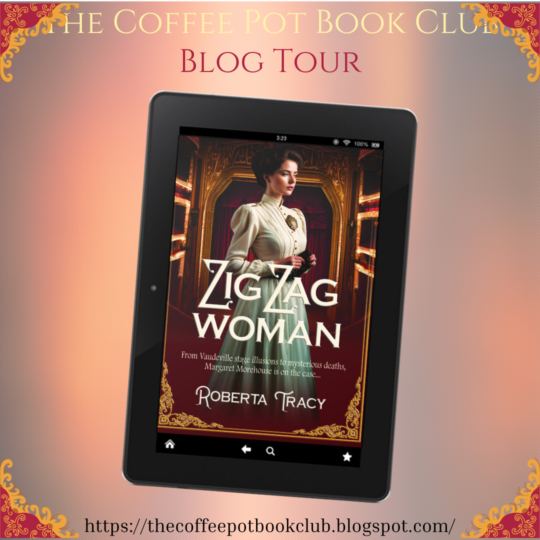
Gasps arose from the uninitiated audience. After Marco waved his hands in front of Margaret’s eyes, she pretended to fall into a wide-eyed trance and swooned into his arms. He gently lowered her limp form onto the table. Giacomo helped him position the cabinet in such a way her hands stuck out through the top holes and head extended beyond the semicircular neck opening. Two feet jutted out the opposite side. They weren’t hers, although the shoes were identical.
She drew her knees up to her chest. Secreted in the lower half of the table below, the kitchen lad extended his stockinged feet in ladies’ shoes through the opposite end. There was enough space between his head and her bottom for two audience volunteers to pull an enormous saw through the soft wood without injuring either of them. The men looked horrified; whether from the wink and smile her head gave them or the grisly deed they might have performed, she would never know.


Twitter: @cathiedunn
Instagram & Threads: @thecoffeepotbookclub
Bluesky: @cathiedunn.bsky.social
July 4, 2024
Nicolette Croft The Curse of Maiden Scars #HistoricalFiction #WomensFiction #Venice #BlogTour #TheCoffeePotBookClub @croft_nicolette @cathiedunn
I‘m delighted to feature author Nicolette Croft in The Coffee Pot Book Club Blog Tour being held between July 1st – 5th, 2024. Nicolette Croft is the author of the Historical Fiction / Women’s Fiction, The Curse of Maiden Scars (Maiden, Mother, Crone), released by Historium Press on June 4, 2024 (286 pages).
Below are highlights of The Curse of Maiden Scars, Nicolette Croft’s author bio, and an excerpt from her book.
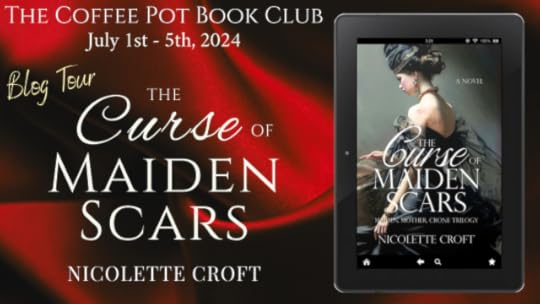
Tour Schedule Page: https://thecoffeepotbookclub.blogspot.com/2024/06/blog-tour-the-curse-of-maiden-scars-by-nicolette-croft.html
HIGHLIGHTS: THE CURSE OF MAIDEN SCARS
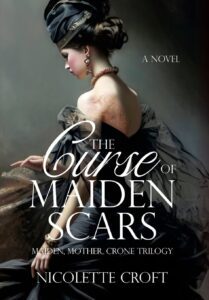
The Curse of Maiden Scars(
Maiden, Mother, Crone)
By Nicolette Croft
Coming in August 2024: Audiobook narrated by Liz May Brice
Blurb:
Sixteen-year-old Renna Covert toils away in the shadows of a Yorkshire workhouse, her days filled with the mundane task of shelling cotton and the dangerous duty of scouting for punters. One fateful night, she crosses paths with two sailors and finds herself thrust into the heart of a chilling encounter at the local asylum.
These harrowing experiences catalyze Renna’s journey, promising newfound opportunities and revealing long-buried family secrets. Yet, at every turn, powerful forces conspire to thwart her quest for truth, forcing her to abandon her scullery work and embark on a daring escape to Venice alongside her steadfast companions.
In the labyrinthine alleys of Venice, Renna’s fate takes yet another twist. She is ensnared by a cunning Madam who trains her as a Venetian courtesan. But beneath the veneer of luxury lies a world fraught with danger, where Renna must rely on her withs and resilience to navigate the treacherous waters of deceit and betrayal.
Set against the backdrop of Venice’s tumultuous Napoleonic invasion of 1797, this is a tale of a girl’s struggle for survival. It is a story of resilience, defiance in the face of adversity, and, ultimately, one young woman’s determination to reclaim her identity.
Buy Link:
Universal Buy Link: https://books2read.com/u/mgDEOq
AUTHOR BIO: NICOLETTE CROFT

Nicolette Croft can’t remember a time when she was not creating imaginary worlds inspired by her Hungarian and American ancestors. As a neuro-divergent learner, however, putting those stories to paper proved more challenging than imagining them. Because her determination would not allow her to settle, she pursued an English B.A. to improve her writing.
Young motherhood also brought unexpected challenges, which motivated her to pursue graduate work in twice-exceptional learners and education. She would later add an M.A. degree in Clinical Mental Health Counseling, specializing in neurodivergent people, trauma, and grief. Nicolette uses her natural gift of storytelling as an exploratory method for her clients.
The Curse of Maiden Scars is also an outgrowth of her personal journey and marks her first publication as a novelist, having previously published short fiction. When not at her counseling practice or researching historical facts for her latest story, Nicolette shares treasured time with family, friends, and her husband. Whether writing, cooking, traveling, or learning, the act of creation is always at the center of her colorful life.
Author Links:
Website: https://www.nicolettecroft.com
Twitter: https://x.com/croft_nicolette
Facebook: https://www.facebook.com/NicoletteCroftAuthor/
LinkedIn: https://www.linkedin.com/in/nicolette-croft-a6744929a/
Instagram: https://www.instagram.com/nicolettecroft/
Threads: https://www.threads.net/@nicolettecroft
Amazon Author Page: https://www.amazon.com/stores/Nicolette-Croft/author/B0D3KPG536/
Goodreads: https://www.goodreads.com/user/show/178035999-nicolette-croft
EXCERPT: THE CURSE OF MAIDEN SCARS
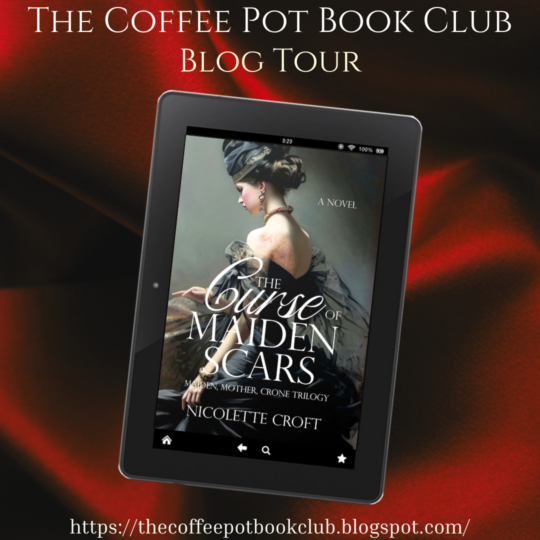
Taking the seat and tapping Francese’s cage, awakening him, I perched at my dressing table and bore Mother’s attention. I hoped her assistance meant she felt regret for her treatment of me. Of course, I could never trust or forgive her, for I was no longer naïve to her machinations. She spoke little as she arranged the wig, tightly securing it with pins to a bun of my hair. She positioned me where I could not take in my likeness, covertly completing her task. I caught a whiff of the tresses as they brushed against my nose. The smell reminded me of the asylum.
“How did you learn about social expectations?” I was genuinely interested.
“Venice was not always my life. I had a family and was raised as a lady.”
I craned to see her face in the mirror, but she stood too far in the periphery. “Camilla said you came from a good family, and there were once three of you. Neither of you ever name your other sister. What happened?”
“She died.” Mother pushed me toward the mirror. “Tell me what you think.”
My questions vanished from me as I admired her work. I couldn’t believe it was me—skin white, flawless like new porcelain. Charcoal outlined my hazel eyes and accentuated the gold fleck. The bright rouge on my cheeks left a healthy complexion. All was topped with the silkily plated wig as if it had been gilded.
I looked at her with astonishment, “Is this me?”
She appeared satisfied. Her fingers brushed the base of my neck. “You are stunning” Her coloring changed, cheeks reddening as the light in her eyes faded as if she had let something slip.
I took the reaction as regret for an inadvertent compliment. Watching myself in the mirror, I needlessly fixed my hair at the side of the wig and elegantly positioned my head. “I don’t know what my mother resembled, but at this moment, I’m glad to embody myself.” Haughty, indeed, but she had made me beautiful, unbelievably so.
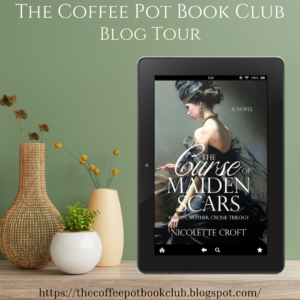

Twitter: @cathiedunn
Instagram & Threads: @thecoffeepotbookclub
Bluesky: @cathiedunn.bsky.social
June 30, 2024
R.w. Meek The Dream Collector Sabrine & Vincent van Gogh #HistoricalFiction #LiteraryFiction #VincentVanGogh #BlogTour #TheCoffeePotBookClub @cathiedunn
I‘m delighted to feature author R.w. Meek again in The Coffee Pot Book Club Blog Tour being held between July 1st – 5th, 2024. R.w. Meek is the author of the Historical Fiction, The Dream Collector (Book 2 Sabrine & Vincent van Gogh), released by Historium Press on April 30th, 2024 (651 pages).
Below are highlights of The Dream Collector: Sabrine & Vincent van Gogh, R.w. Meek’s author bio, and an excerpt from his book.
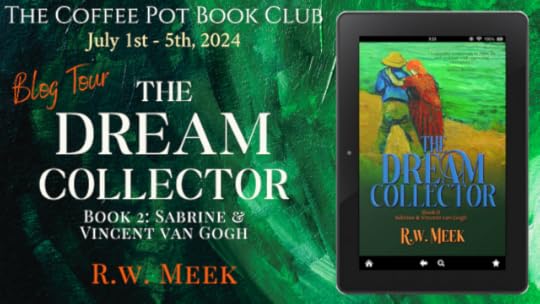
Tour Schedule Page: https://thecoffeepotbookclub.blogspot.com/2024/05/blog-tour-the-dream-collector-by-rw-meek.html
HIGHLIGHTS: THE DREAM COLLECTORSABRINE & VINCENT VAN GOGH
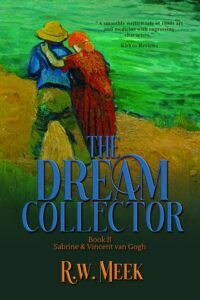
The Dream Collector
(Book 2 Sabrine & Vincent van Gogh)
by R.w. Meek
Blurb:
Sabrine, hospitalized for five years at the infamous Salpêtrière Asylum for Women, gains her release due to intervention of her sister Julie Forette and a young Sigmund Freud. The reunited sisters are introduced to the dazzling art milieu of 1886 Paris, and soon become close friends to the leading Impressionists. Sabrine attracts a cult following as a poetess, the enigmatic “Haiku Princess.” Seemingly cured by Freud of her Grand Hysteria, Sabrine soon enters into a tumultuous relationship with Vincent van Gogh.
Julie and Sigmund Freud, alarmed by the eerie parallels between the emotionally volatile couple and their self-destructive impulses, begin an urgent search to discover the root causes for Sabrine and Vincent’s growing psychoses. Julie, ‘The Dream Collector’ seeks their most unforgettable dream for Freud’s interpretation and revelations occur.
The Dream Collector is an exploration of the psychological consequences of betrayal, abandonment, and the redemptive power of art.
Buy Links:
Universal Buy Link: https://books2read.com/u/baLazP
Hardback Link US: https://www.amazon.com/Dream-Collector-Sabrine-Vincent-Gogh/dp/1962465349
AUTHOR BIO: R.W. MEEK

R.w. Meek has a Master’s degree in Art History from the American University in Washington, D.C., his areas of expertise are Impressionism and Post-Impressionism, with a particular interest in Vincent van Gogh.
His first novel The Dream Collector “Sabrine & Sigmund Freud” was voted runner-up by the Historical Fiction Company for best novel of 2022.
Born in Baltimore, he currently resides with his wife Pamela in Santa Clarita, California. He’s passionate about art, cinema, literature and jazz. His two dogs, Reve and Banjo, were awarded angelic status in heaven.
Author Links:
Website: https://www.ronmeekauthor.com
Facebook: https://www.facebook.com/people/Rw-Meek/100010220437381/
Amazon Author Page: https://www.amazon.com/stores/R.-w.-Meek/author/B0CZJ8JDP5
YouTube: https://www.youtube.com/channel/UCLf52C_8VYyMbHMSL_jfv-g
EXCERPT: THE DREAM COLLECTORSABRINE & VINCENT VAN GOGH
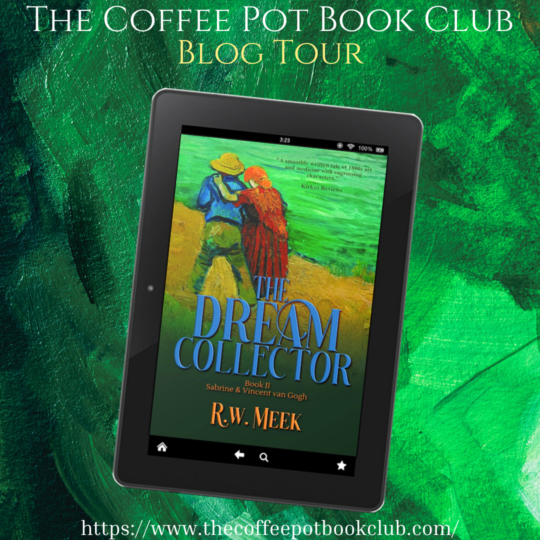
“The Mermaid Palace”
MAP IN HAND, I followed Theo’s route to the brothel district. At Place Victor Hugo, I stopped and thought this square might be where Vincent confronted Gauguin with a straight razor. According to Gauguin, his stare alone stopped Vincent in his tracks, causing him to run back to the Yellow House and use the razor on himself. The suspicion I brought to Arles was that the two artists, who held each other in high regard, would not reach such a violent juncture, unless there was a woman involved. Would the prostitute Rachel talk with me?
I reached Place du Calvaire, a three-quarter circle of tall, dreary houses except for the three Maisons de Tolerance, each brazenly painted a different primary colour. I kept a safe distance from House #1, Vincent’s brothel of choice, where his favorite Rachel worked. I lingered and wondered if Sundays were a busy day for brothels?
House of Tolerance #1 was painted a lurid purple-blue which I thought could have only been attractive to the coarsest eye. Gauguin mentioned that the brothel was ruled by a Madame Virginie. I knocked, but no one answered, every window shuttered, and the front door latch locked.
I noticed narrow alleyways separated the houses around the circle. The gated alleyway next to the brothel was unlocked. Creaking open, I ventured into a dark, dank, and urine smelling passageway, coming to separate wooden gates.’ I pushed open the one leading to the back of the brothel. The scene before me defied immediate comprehension.


Twitter: @cathiedunn
Instagram & Threads: @thecoffeepotbookclub
Bluesky: @cathiedunn.bsky.social
June 25, 2024
Nancy Jardine Novice Threads #VictorianSaga #HistoricalFiction #Scotland #WomensFiction #BlogTour #TheCoffeePotBookClub @nansjar @cathiedunn
I‘m delighted to introduce Nancy Jardine as the featured author in The Coffee Pot Book Club Blog Tour being held between June 5th – 26th, 2024. Nancy Jardine is the author of the Victorian Scotland Saga / Historical Fiction / Women’s Fiction, Novice Threads (Silver Sampler Series), released by Nancy Jardine with Ocelot Press on 15th May 2024 (356 pages).
Below are highlights of Novice Threads, Nancy Jardine’s author bio, and an excerpt from her book

Tour Schedule Page: https://thecoffeepotbookclub.blogspot.com/2024/04/blog-tour-novice-threads-by-nancy-jardine.html
HIGHLIGHTS: NOVICE THREADS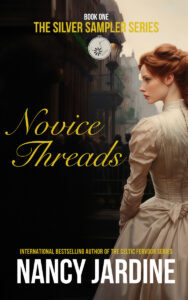
Novice Threads
(Silver Sampler Series)
by Nancy Jardine
Blurb:
A thirst for education. Shattered dreams. Fragile relations.
1840s Scotland
Being sent to school is the most exhilarating thing that’s ever happened to young Margaret Law. She sharpens her newly-acquired education on her best friend, Jessie Morison, till Jessie is spirited away to become a scullery maid. But how can Margaret fulfil her visions of becoming a schoolteacher when her parents’ tailoring and drapery business suddenly collapses and she must find a job?
Salvation from domestic drudgery – or never-ending seamstress work – comes via Jessie whose employer seeks a tutor for his daughter. Free time exploring Edinburgh with Jessie is great fun, but increasing tension in the household claws at Margaret’s nerves.
Margaret also worries about her parents’ estrangement, and the mystery of Jessie’s unknown father.
When tragedy befalls the household in Edinburgh, Margaret must forge a new pathway for the future – though where will that be?
Buy Links:
This title is available to read on #Kindle Unlimited.
Universal Buy Link: https://mybook.to/NTsss
AUTHOR BIO: NANCY JARDINE
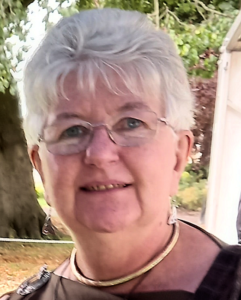
Nancy writes historical and contemporary fiction. 1st Century Roman Britain is the setting of her Celtic Fervour Series. Victorian and Edwardian history has sneaked into two of her ancestry-based contemporary mysteries, and her current Silver Sampler Series is set in Victorian Scotland.
Her novels have achieved Finalist status in UK book competitions (People’s Book Prize; Scottish Association of Writers) and have received prestigious Online Book Awards.
Published with Ocelot Press, writing memberships include – Historical Novel Society; Romantic Novelists Association; Scottish Association of Writers; Federation of Writers Scotland; Alliance of Independent Authors.
Author Links:
Website: http://www.nancyjardine.com/
Twitter: https://twitter.com/nansjar
Facebook: https://www.facebook.com/NancyJardinewrites/
LinkedIn: https://www.linkedin.com/in/nancy-jardine-a919b03a/
Instagram: https://www.instagram.com/nansjar2023/
Bluesky: https://bsky.app/profile/nansjar23.bsky.social
Pinterest: https://www.pinterest.co.uk/nanjar/
Book Bub: https://www.bookbub.com/profile/nancy-jardine
Amazon Author Page: viewauthor.at/findmybookshere
Goodreads: https://www.goodreads.com/author/show/5139590.Nancy_Jardine
EXCERPT: NOVICE THREADS

How To Console Your Best Friend.
September 1847
Margaret skipped her way down South Street in the hope that Jessie would already be outside and down at the Queich Bridge. It had been weeks since they’d been able to play together, poor Jessie having to do even more work at home since Ruth was really poorly now. The cough that had plagued Ruth for years had got a lot worse. Ruth had never been able to go back to the mill as a Fine Drawer. The mill wouldn’t employ her in any capacity, not even for sweeping the floor.
For a few months, Ruth had been doing some sewing work when she could get it, but it wasn’t for Miss Reid. It was just poorly-paid mending that other women couldn’t find time to do. Worst of all, Jessie had said that her mother had stopped going outside the house in the evenings and was now like a shadow moping around all the time.
“She nivver gets oot her bed noo, except to go tae the necessary,” Jessie had said the last time they’d seen each other. “She mends a bit, here and there, propped up oan pillows. But she maistly falls asleep.”
That meant that Jessie had to lie on the floor to sleep on a couple of old blankets because there was only room for her granny at the edge of the bed, since Ruth took up most of the space.
Margaret didn’t think that sounded very comfortable. Or fair.
July had been cold and all-the-time rainy, August not much better. That wasn’t fair either, because school had stopped at the end of May for the younger children and Margaret was bored. When it rained and she couldn’t get out to play, Peggy made her do even more sewing. It was so repetitive that the only thing that stopped her from falling asleep was the needle stabbing into her fingers.
It wasn’t the actual rain that kept Margaret from playing outside, it was more that Peggy got so cross when she returned home soaked. It was worse for Jessie if her clothes got wet because Jessie didn’t have a Sunday dress to change into dry clothes.
As soon as she got closer to Jessie’s house, Margaret knew that something was going on. Jessie was sitting outside on her doorstep and looked as if she’d been crying for days on end. Her blonde hair was all mussed up like a haystack.
Margaret didn’t say anything at first. She just sat next to Jessie and took her hand into her own, giving it a very gentle squeeze. Jessie didn’t even look at her. Big tears leaked out of her eyes and slid down to drip off her chin, her gaze focused straight ahead at the cottage on the other side of the road, but since Margaret could see nothing happening over there, she didn’t think that Jessie was seeing anything at all. After a tiny while she couldn’t keep quiet.
“Is your ma very bad?” She kept her voice to a whisper.
Eventually, Jessie’s anguished blue gaze turned towards her. “Ruth’s gone.”
Margaret didn’t know what to say. She had a feeling that the ‘gone’ wasn’t to Kinross, or any other place that she knew of. Her fears were confirmed when Jessie hiccupped, her eyes overflowing with distress.
“I dinnae think she’s gone tae heaven.” Big sobs now racked poor Jessie’s body. Margaret snuggled in even closer and put her arm around Jessie’s shoulder.
“Why would she not go there?” She wasn’t sure how to console.
“Ma granny told Ruth last night tae prepare hersel’. Because she’d never repented properly, heaven wisnae where she’d eventually be bidin’.”
Margaret felt her mouth gape open. Hell was for terrible people. Ruth had seemed a bit selfish, but surely, she wasn’t that bad?
“I’ve been telt to sit outside but I’ve no tae move frae the step. There’s a wifie wha’ bides up the street called Mistress Byers. She’s a freen o’ ma granny and she’s in there jist noo. Granny says that she’s the best at the laying-out duties in Milnathort, whitiver that means. They’re getting ma mither into her best Sunday dress, though I dinnae ken how they’re doing that, because she cannae move or talk ony mair.”
Margaret thought about that. “Your mother always liked to wear her best clothes when she went to your Parish Kirk on a Sunday. And you said she always did her hair all fancy. Maybe it’s because she’s not managed to go there for a while, and…” she hesitated before continuing, not sure about her words, “…because she’ll not be going again.”
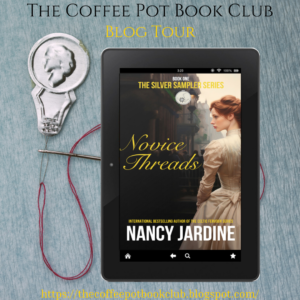

Twitter: @cathiedunn
Instagram & Threads: @thecoffeepotbookclub
Bluesky: @cathiedunn.bsky.social
June 23, 2024
Book Spotlight Trouble in Assisi Heidi Eljarbo #HistoricalMystery #ArtMystery #DualTimeline #BlogTour #TheCoffeePotBookClub @HeidiEljarbo @cathiedunn
I am pleased to spotlight the book, Trouble in Assisi, by Heidi Eljarbo in The Coffee Pot Book Club Blog Tour being held on June 24th – 28th, 2024. Trouble in Assisi (A Fabiola Bennett Mystery) is a Historical Mystery / Dual Timeline Mystery that was independently published by the author on 28th May 2024 (225 pages).
Below are highlights of Trouble in Assisi and Heidi Eljarbo’s author bio.

Tour Schedule Page: https://thecoffeepotbookclub.blogspot.com/2024/05/blog-tour-trouble-in-assisi-by-heidi-eljarbo.html
HIGHLIGHTS: TROUBLE IN ASSISI
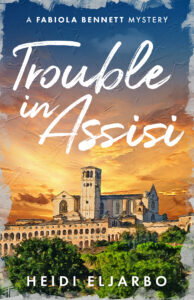
Trouble in Assisi
(
A Fabiola Bennett Mystery
)
by Heidi Eljarbo
Blurb:
Assisi, 1973.
On art historian Fabiola Bennett’s first day in Assisi, a local gentleman takes her aside to ask for advice about a painting that has wondrously appeared in the basilica’s bell tower.
So much for enjoying relaxing days filled with dining on pasta and gelato.
Soon, Fabiola and her besties, Pippa and Cary, are thrown into a shrouded mystery and caught up in a whirlwind of intrigue, theft, lies, and attempted murder, all of which overshadows the postcard-like charm of the small, historic town.
Rome, 1511.
Life is going well for Teodoro Nicoletti. Since he was a young man in Florence, he has worked and learned alongside the most-favored artist Raphael.
When Pope Julius II commissions Raphael to paint several frescos in the reception rooms of the Vatican Palace, Teodoro follows his master to Rome and discovers firsthand the admiration and rivalry between Raphael and two other reigning artists: Michelangelo and Leonardo da Vinci.
But the prickliest thorn in Teodoro’s side is his beloved Elisabetta’s father. The old man is determined to keep his youngest daughter from becoming Teodoro’s wife.
Buy Links:
This title is available to read on #KindleUnlimited.
Universal Buy Link: https://books2read.com/u/4N5ZE6
AUTHOR BIO: HEIDI ELJARBO

Heidi Eljarbo grew up in a home full of books, artwork, and happy creativity. She is the author of historical novels filled with courage, hope, mystery, adventure, and sweet romance during challenging times. She’s been named a master of dual timelines and often writes about strong-willed women of past centuries.
After living in Canada, six US states, Japan, Switzerland, and Austria, Heidi now calls Norway home. She lives with her husband on a charming island and enjoys walking in any kind of weather, hugging her grandchildren, and has a passion for art and history.
Her family’s chosen retreat is a mountain cabin, where they hike in the summer and ski the vast white terrain during winter.
Heidi’s favorites are her family, God’s beautiful nature, and the word whimsical.
Author Links:
Website: https://www.heidieljarbo.com/
Twitter / X: https://x.com/HeidiEljarbo
Facebook: https://www.facebook.com/authorheidieljarbo/
Instagram: https://www.instagram.com/authorheidieljarbo/
Pinterest: https://no.pinterest.com/heidieljarbo/
Book Bub: https://www.bookbub.com/profile/heidi-eljarbo
Amazon Author Page: https://amazon.com/author/heidieljarbo
Goodreads: https://www.goodreads.com/author/show/16984270.Heidi_Eljarbo
Newsletter: https://www.heidieljarbo.com/newsletter

 Twitter: @cathiedunn
Twitter: @cathiedunn
Instagram & Threads: @thecoffeepotbookclub
Bluesky: @cathiedunn.bsky.social
June 20, 2024
I. M. Foster Murder on West Main #MurderOnWestMain #IMFoster #HistoricalMystery #CozyMystery #BlogTour #TheCoffeePotBookClub @IMFosterMystery @cathiedunn
I‘m delighted to introduce I. M. Foster as the featured author in The Coffee Pot Book Club Blog Tour, held between June 19th – 21st, 2024. I. M. Foster is the author of the Historical Fiction /Historical Mystery, Murder on West Main (A South Shore Mystery), released by the author on December 20th, 2023 (368 pages).
Below are highlights of Murder on West Main, I. M. Foster’s author bio, and a snippet from her book.
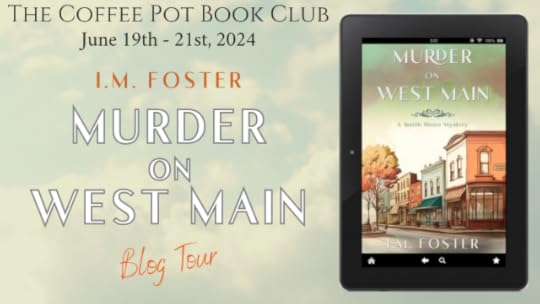
Tour Schedule Page: https://thecoffeepotbookclub.blogspot.com/2024/05/blog-tour-murder-on-west-main-by-im-foster.html
HIGHLIGHTS: MURDER ON WEST MAIN
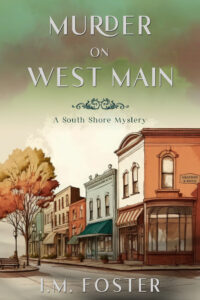
Murder on West Main
(A South Shore Mystery)
by I. M. Foster
Blurb:
When Colin Brissedon arrives at work one summer morning to find his new boss murdered, all eyes turn to him. After all, the man had threatened to fire him just a few days before, and his colleagues are more than happy to tell the tale. Kathleen admits her brother is no angel, but she can’t believe he would sink this low. Fortunately for them, neither does Daniel O’Halleran, the village’s new coroner’s assistant. Of course, he needs more than his gut feeling to prove it.
But that’s not going to be an easy task, considering the victim does not appear to have been held in high regard. In fact, Daniel is hard-pressed to find anyone who did like him, though there are more than a few who had reason to wish the man dead. To make matters worse, Kathleen is intent on conducting her own investigation despite his wishes, and he fears the consequences could be deadly.
And yet, with the pieces of the puzzle laid before him, he can’t shake the feeling that something is missing, an integral clue that will tie everything else together. Will Daniel be able to find the elusive detail and discover the reason behind the gruesome murder of the prominent attorney? Or will the guilty party live to kill again?
Buy Links:
This title is available to read on #KindleUnlimited.
Universal Buy Link: https://books2read.com/u/bx5z0D
AUTHOR BIO: I.M. FOSTER

I.M. Foster is the pen name author Inez Foster uses to write her South Shore Mystery series, set on Edwardian Long Island. Inez also writes historical romances under the pseudonym Andrea Matthews, and has so far published two series in that genre: Thunder on the Moor series, a time-travel romance set on the 16th century Anglo-Scottish Borders, and the Cross of Ciaran series, which follows the adventures of a fifth century Celt who finds himself in love with a twentieth century archaeologist.
Inez is a historian and librarian, who loves to read and write and search around for her roots, genealogically speaking. She has a BA in History and an MLS in Library Science and enjoys the research almost as much as she does writing the story. In fact, many of her ideas come to her while doing casual research or digging into her family history. Inez is a member of the Long Island Romance Writers and the Historical Novel Society.
Author Links:
Website: www.imfostermysteries.com
Twitter: http://www.twitter.com/IMFosterMystery
Facebook: http://www.facebook.com/IMFosterMysteries
Instagram: www.instagram.com/imfosterauthor
Book Bub: https://www.bookbub.com/profile/i-m-foster
Amazon Author Page: https://www.amazon.com/stores/I.-M.-Foster/author/B0BFQK8854/
Goodreads: https://www.goodreads.com/author/show/22926746.I_M_Foster
SNIPPET: MURDER ON WEST MAIN
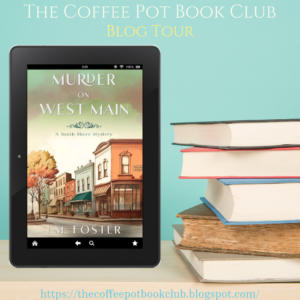
Kathleen felt a chill run through her despite the sun’s warmth.
 Twitter: @cathiedunn
Twitter: @cathiedunn
Instagram & Threads: @thecoffeepotbookclub
Bluesky: @cathiedunn.bsky.social
June 18, 2024
Deborah Swift The Fortune Keeper #FortuneKeeper #HistoricalFiction #BlogTour #TheCoffeePotBookClub @swiftstory @cathiedunn
I‘m delighted to host Deborah Swift as the featured author in The Coffee Pot Book Club Blog Tour being held between June 10th – 21st, 2024. Deborah Swift is the author of the Historical Fiction, The Fortune Keeper (Italian Renaissance Series), released by Quire Books on 24th November 2022 (412 pages).
Below are highlights of The Fortune Keeper, Deborah Swift’s author bio, and an excerpt from her book

Tour Schedule Page: https://thecoffeepotbookclub.blogspot.com/2024/05/blog-tour-the-fortune-keeper-by-deborah-swift.html
HIGHLIGHTS: THE FORTUNE KEEPER
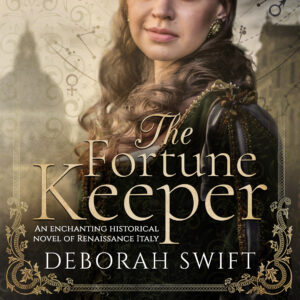
The Fortune Keeper
(Italian Renaissance Series)
by Deborah Swift
Blurb:
Count your nights by stars, not shadows ~ Italian Proverb
Winter in Renaissance Venice
Mia Caiozzi is determined to discover her destiny by studying the science of astronomy. But her stepmother Giulia forbids her to engage in this occupation, fearing it will lead her into danger. The ideas of Galileo are banned by the Inquisition, so Mia must study in secret.
Giulia’s real name is Giulia Tofana, renowned for her poison Aqua Tofana, and she is in hiding from the Duke de Verdi’s family who are intent on revenge for the death of their brother. Giulia insists Mia should live quietly out of public view. If not, it could threaten them all. But Mia doesn’t understand this, and rebels against Giulia, determined to go her own way.
When the two secret lives collide, it has far-reaching and fatal consequences that will change Mia’s life forever.
Set amongst opulent palazzos and shimmering canals, The Fortune Keeper is the third novel of adventure and romance based on the life and legend of Giulia Tofana, the famous poisoner.
‘Her characters are so real they linger in the mind long after the book is back on the shelf’~ Historical Novel Society
NB This is the third in a series but can stand alone as it features a new protagonist. Other two books are available if reviewers want them.
Trigger Warnings:
Murder and violence in keeping with the era.
Buy Links:
This title is available to read on #KindleUnlimited.
Universal Link: https://mybook.to/FortuneKeeper
Audiobook Buy Links:
Kobo: https://www.kobo.com/gb/en/audiobook/fortune-keeper-the
Audio: https://www.audible.com/pd/The-Fortune-Keeper-Audiobook/B0C641CBLN
AUTHOR BIO: DEBORAH SWIFT

Deborah Swift is a USA TODAY bestselling author who is passionate about the past. Deborah used to be a costume designer for the BBC, before becoming a writer. Now she lives in an old English school house in a village full of 17th Century houses, near the glorious Lake District. Deborah has an award-winning historical fiction blog at her website www.deborahswift.com.
Deborah loves to write about how extraordinary events in history have transformed the lives of ordinary people, and how the events of the past can live on in her books and still resonate today.
The first in her series about the Renaissance poisoner Giulia Tofana, The Poison Keeper, was a winner of the Wishing Shelf Book of the Decade, and a Coffee Pot Book Club Gold Medal, and the latest in her WW2 Secret Agent series, Operation Tulip, is coming soon.
Author Links:
Website: www.deborahswift.com
Twitter: https://twitter.com/swiftstory
Facebook: https://www.facebook.com/authordeborahswift/
Pinterest: https://www.pinterest.co.uk/deborahswift1/
Bookbub: https://www.bookbub.com/authors/deborah-swift
Amazon: http://author.to/DeborahSwift
EXCERPT: THE FORTUNE KEEPER

Chapter 1
Venice
November 1643
Mia unhooked the clasp and swung her cloak off, hanging it on the back of a chair. ‘Here, signor. The new Torah, properly bound at last,’ she placed the book before him like an offering.
‘Ah!’ Signor Bravaggio picked up the top volume and lifted it towards his nose. ‘There’s nothing I like more than the smell of new books. Especially Jewish books!’ He inhaled deeply then turned the book in his hand, weighed it, sniffed it again, then smoothed the surface of the embossing with his thumb. ‘Beautiful. Your father has done another exceptional job with the binding. I hate to see these go, but my client is getting impatient, and won’t wait.’
Bravaggio examined the other volumes and then unlocked the iron bound coffer that lived in the kneehole under the desk. She paced around the room examining it for anything new, but turned at the rattle of coins.
He dropped a jute bag on the table before her. ‘Same as we agreed,’ he said. ‘Be careful carrying that amount around the streets.’ He withdrew a sheaf of unbound paper from the coffer and flapped it at her. ‘The Trickster of Seville by a monk, Tirso de Molina,’ he said. ‘A play in Spanish, but the translation is with it. Tell Herr Weber it’s to be set in print and then bound in red calfskin like the others. And here; the new Haggadà, the rite written in everyday Italian.’ He handed her a slim wooden-bound volume. ‘Space for pictures too, if Herr Weber can find someone brave or foolish enough to carve them.’
‘Not a chance. But Fabio will love binding this Haggadà as much as the play. He reads them all, you know, before he makes the covers. He’s never been in a synagogue but he’s the best-educated Jew in the ghetto.’
Bravaggio laughed. ‘He knows a good idea when he sees one, your father.’
‘I worry he doesn’t go to Mass though; it might raise questions with the Inquisition.’
‘Don’t even speak of the name. Fabio’s always been his own man; he’ll be all right. It’s Weber’s good fortune he took him on, or Weber’d have no print business at all. But here, something else that will interest you.’ He smiled and passed over a hand-copied manuscript. She read the frontispiece and saw it was by Girolamo Cardano — an astrological commentary.
She looked up, to see Bravaggio’s amused eyes.
‘Is this what I think it is?’
He laughed; a dry, parched sound. ‘The one that dares to include a horoscope of Jesus the Galileean? Yes. Cardano lost his professorship over it.’
‘You’d trust me with this?’
‘As long as you’re careful. It’s not for binding, just for reading. And I want it back when I return. ’ He tapped his nose. ‘Like the others, it’s on the Index Librorum Prohibitorum. If anyone catches you with it, the Inquisitors will want to know. But knowing your interest in the heavens, I know you’ll be careful.’
‘I wish you’d reconsider and take me as a student, teach me what you know, signor.’
‘I’ve told you, I’m too old for teaching now. And you know it’s not possible. Fabio says that your mother doesn’t hold with anything that even whiffs of a dispute with the church.’
Mia put everything into her calico shoulder bag, along with the money. ‘Yes, these days Giulia forbids nearly everything.’ She sighed. ‘It makes things hard. But there’s nowhere else I can go. Only the convent. She frowns every time I get out my charts. When shall I tell Fabio these others must be finished?’
‘For when I return. I’ll be gone a month, but you understand it’s not for my benefit, but for the benefit of my Armenian client, and those awaiting the new thoughts from Madrid. But to some, it’s heresy. So be careful.’
‘So what’s new? Everything you give me is heresy. You’d have no business without it.’
Bravaggio chuckled, and wagged his finger at her. ‘Why do you think I wear gloves? To keep the stink of it off my hands.’
She grinned at him. They understood each other. He knew she loved coming here, to his library, full of shelved books from floor to ceiling, and the drawers full of old parchments from antiquity and the fresh printings of new ideas, like new shoots coming up from the earth. Only to him could she explain her restless mind, and her obsession with the stars and the night sky.
Thank you for hosting me!
Deborah
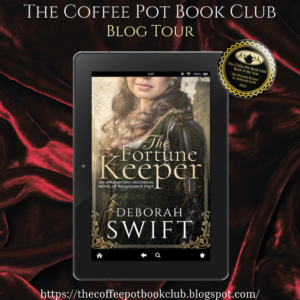

Twitter: @cathiedunn
Instagram & Threads: @thecoffeepotbookclub
Bluesky: @cathiedunn.bsky.social



